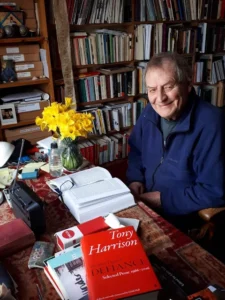The literary world is mourning the loss of Tony Harrison, the acclaimed Leeds-born poet, playwright, and translator, whose passing marks the end of an extraordinary era in British poetry. With a career spanning decades, Harrison carved out a place as one of the most distinctive and powerful voices in modern literature, celebrated for his ability to bring poetry beyond the page and into the hearts of everyday people.

Born in Leeds, Harrison was shaped by his working-class background, and much of his writing reflected a deep engagement with themes of identity, class, language, and culture. He had a rare gift for making poetry accessible without losing its complexity or emotional depth. From the lecture halls and libraries to the stage, screen, and radio, Harrison’s words reached far and wide, influencing generations of readers, writers, and performers. His ability to combine intellectual rigor with emotional resonance made him a giant in the literary landscape.
Tributes have poured in since news of his passing, with many noting not only his towering presence in British letters but also his quiet, personal acts of kindness. One friend recalled a moving story about Harrison writing a heartfelt letter of comfort to a grieving widow, an act unseen by the public but deeply remembered by the recipient. This moment captures what made Harrison so special: his humanity and his genuine compassion that existed far beyond the public acclaim of his poetry.
Leeds, his home city, is particularly proud to have given the world a poet of his stature. Harrison often wove his Yorkshire roots into his work, embracing local speech and rhythms, and showing the power of dialect and place in shaping literature. His work gave voice to communities often overlooked, bridging the gap between the working-class streets of Leeds and the global stage of poetry. For many, his success was not just personal—it was also a victory for the community he came from and never forgot.
Harrison’s legacy stretches across multiple mediums. His verse plays challenged conventions and invited audiences to engage with poetry in new, innovative ways. His film poems, broadcast on television, redefined how poetry could intersect with visual storytelling. His live readings were renowned for their power and intimacy, drawing listeners into the cadence of his words in unforgettable ways. Whether on the page or in performance, Harrison made poetry matter—he proved it was not only alive but urgent and necessary.
Yet beyond all his achievements, Tony Harrison is being remembered for his humility, kindness, and generosity of spirit. Those who knew him personally describe him as approachable, thoughtful, and always willing to offer encouragement. His life serves as a reminder that greatness in art is best matched with grace in humanity.
As the world mourns, Leeds and the wider literary community take pride in the legacy Tony Harrison leaves behind. His words will continue to inspire, provoke, and console for generations to come.
Rest in peace, Tony Harrison.


Leave a Reply